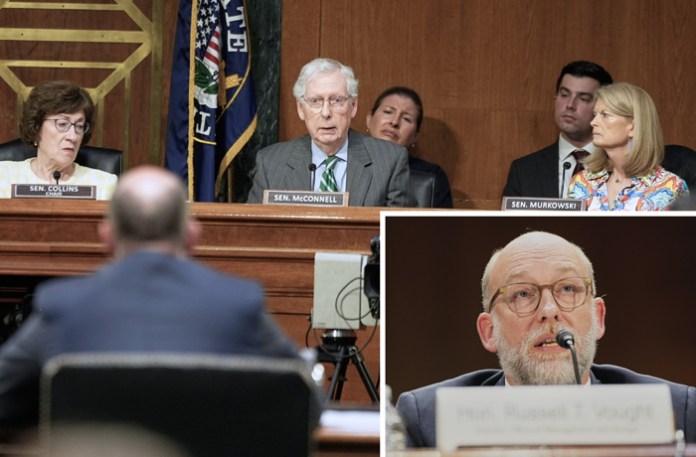


President Donald Trump recently moved to cancel $4.9 billion in spending on foreign aid, the latest skirmish in the battle for control of the federal budget between the White House‘s Office of Management and Budget and Congress’s appropriations committees.
Trump’s Aug. 28 rescission message to Congress in effect declared that the administration will not spend funding provided in the Department of State, Foreign Operations, and Related Programs Appropriations Act of 2025. The proposal would nix $3.2 billion in international development program spending, $900 million in contributions to the United Nations, $326 million in international peacekeeping funds, and hundreds of millions of grants to foreign nations.
Recommended Stories
- Trump says 'scum' Omar should be impeached, claims she married her brother
- Top four takeaways from House Oversight hearing on DC crime
- Democrats delay House hearing by forcing vote to subpoena Noem
“The Trump Administration is committed to getting America’s fiscal house in order by cutting government spending that is woke, weaponized, and wasteful,” noted a statement released by the White House. “Now, for the first time in 50 years, the President is using his authority under the Impoundment Control Act to deploy a pocket rescission, cancelling $5 billion in foreign aid and international organization funding that violates the President’s America First priorities.”

Congress first approved the spending last autumn in legislation signed by former President Joe Biden, which expired in March 2025. Congress and Trump agreed to extend the funding that same month.
Yet, the Trump administration was clearly spoiling for a fight over who controls the federal purse. A few weeks earlier, it began the process of shuttering USAID without congressional authorization. Trump and GOP legislators partnered to enact a rescissions law that cut $9.4 billion in foreign affairs spending in July, as reported by the Washington Examiner‘s magazine, which drew ire from Republican and Democratic appropriators in Congress.
Citizens Against Government Waste, which advocates lower federal spending, hailed the effort.
“[A]any step to cut wasteful spending when the country has a $37.3 trillion debt should be welcomed by legislators and taxpayers,” wrote Grigory Menshikov, the group’s federal government affairs associate. CAGW was one of dozens of groups and activists that called for the Trump administration to use a pocket rescission.
Yet, not everyone believes the administration’s action was legal. The 1974 Congressional Budget and Impoundment Control Act allows a president to ask Congress not to spend appropriated funds. The president must send a message to the Senate and House specifying the funds they want rescinded. Congress then has 45 days to pass a bill to approve the president’s request. The rescission fails if both chambers do not pass the rescission bill within that time frame.
The Trump administration gamed this process by submitting a rescission request less than 45 days before the end of the fiscal year (Sept. 30), at which point the legal authorization of the appropriation will expire. The pocket rescission, therefore, flips the default control over cancellation of spending from the legislature to the executive.
“Unilateral presidential failure to obligate funds proposed for rescission as required by the ICA, whether such illegal action is given the label of a ‘pocket rescission’ or otherwise, is thus inconsistent with the text of the ICA,” wrote five scholars of the appropriations process in a letter to Congress. “The text of the ICA requires funds proposed for rescission to be made available for obligation unless Congress approves the rescission through legislation.”

The Trump administration argued that it has used its authority under the ICA to request cuts and that it can withhold spending while congressional action is pending. Supporters of the pocket rescission have further pointed out that the law does not forbid the president from sending a rescission message near the very end of the fiscal year.
The U.S. Government Accountability Office disagreed, saying, “The President cannot rely on the authority in the ICA to withhold amounts from obligation, while simultaneously disregarding the ICA’s limitations.”
The pocket veto also raises problems relating to the separation of powers. The Constitution empowers Congress to appropriate funds from the U.S. Treasury for spending. A president may veto any bill, but once it becomes law, they must “take care that the laws be faithfully executed.” The Supreme Court deemed unconstitutional the line-item veto in 1998, by which former President Bill Clinton unilaterally refused to spend money appropriated for particular purposes.
Whatever its constitutional or legal status, the Trump administration’s action has further complicated Congress’s bargaining over fiscal 2026 spending bills. Congress has yet to send any of the 12 annual spending bills to the president, which must be done before Oct. 1 to avoid a partial or full government shutdown. Sen. John Kennedy (R-LA), who sits on the Appropriations Committee, said the odds of a government shutdown are “50-50, perhaps higher.”
POLITICAL VIOLENCE ON THE RISE IN THE US: A TIMELINE OF KEY INCIDENTS
It takes 60 votes to pass an appropriations act in the Senate, and Republicans only occupy 53 seats. Democrats may be in no mood to help Republicans. Earlier this year, Democrats fought bitterly among themselves over whether to support Republicans’ legislation to keep the government open as the Department of Government Efficiency dismantled USAID and Trump fired various officials installed by Biden.
This summer’s rescission law and the attempted pocket veto rubbed salt in their wounds. The price for Democrats to vote for any spending bills or a continuing resolution might be iron-clad provisions forbidding the rescission of the $4.9 billion in foreign aid funds and GOP agreement not to pursue additional rescissions.
Kevin R. Kosar (@kevinrkosar) is a senior fellow at the American Enterprise Institute and edits UnderstandingCongress.org.
